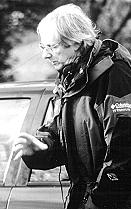| Interview | ||
| Director Ken Loach | ||
| By Ross Anthony | ||
|
Ken Loach ("Bread and Roses"), a slight soft spoken man, young looking for his age, casually dressed and very relaxed, sits ready to talk with us. He's soft spoken, often taking time to think before answering, removing his glasses and squinting his eyes in consideration.  PRESS: Do you feel a sense of betrayal with the Labor unions. KL: Well it's more complicated than that. The rule has been tensions in the Labor movement between one perspective and another. The social-democrat method is the dominant one. That you can make the system work in the interests of everyone and the crumbs that fall from the table will be enough. And there's another perspective that says you've got to turn the table over all together. Which is the one that I support. But that's not been the dominant politics of the Labor Party. But I can get told off for talking politics (chuckles). PRESS: What about Martin in "Sweet Sixteen." KL: Right when you meet him there's a brightness and optimism about him. In the week before he got contacted to play a part in the film he was offered ...ah, he became a professional footballer with the local team. He carried on being a footballer throughout the film. And then he couldn't sustain the training, because he was doing things, acting things. And he gave up being a footballer. But I think he'd sooner been a footballer than an actor. PRESS: He's been sucked into acting? KL: Yes. I'm not sure it's a good idea. PRESS: Tell us what it's like working with untrained actors. KL: It's the same whether they're experienced or not. In fact it's very simple. Shoot in sequence so that the story unfolds as you're shooting. And just try to enable them to be as good as they can be. Just make it seem as naturally as possible. The most creative part of filmmaking is the writer's working. ... The directing part is simply to bring life to that. So that you have the sense of something spontaneous and combustible happen in front of you. PRESS: Why don't you make a movie in Hollywood? KL: Why should I? I made one film in LA. It was the most difficult place to make a film I've ever worked in. I mean, it was easier in Nicaragua. PRESS: Are there any other US cities that captured your curiosity? KL: ...I'm very curiosity about the whole society. I mean how could you not be when it's about to plunge us into a massive catastrophic war. I mean it's an endlessly intriguing society. But I'm not sure I'm qualified to make films about it. It's extraordinarily fascinating how it's controlled and led in a certain direction. I think what's fascinating about the States is the whole history that is not recognized. I mean, the IWW, the Wobblies, Joe Hill, Mother Jones, the Civil Rights movement. The whole other America that is radical and progressive and questioning. And that has become now lead by the nose into the war. It's an extraordinary process. PRESS: What about the film distribution? KL: ...I think the problem we have is exhibition. If British, and European, and world cinema could have access to the screens then we'd have a much more vibrant and diverse cinema. But the point of the market is that it destroys choice. It doesn't give you choice ... because of the tendency towards monopoly. So what we need to do is not rely on the market. Intervene. Establish cinemas which may be owned by the municipality or whatever, but not simply owned by the big chains...Cause there's a huge range of films that we never see. The present system does not work. The idea that at the multi-screens --you'll have 5 screens showing the blockbuster. PRESS: Have your audiences changed? KL: I think there is an appetite for films that describe the world that we all experience. |
||
|
|
||
|
|
||
Copyright © 2001. Ross Anthony, currently based in Los Angeles, has scripted and shot documentaries, music videos, and shorts in 35 countries across North America, Europe, Africa and Asia. For more reviews visit: RossAnthony.com |
||
|




